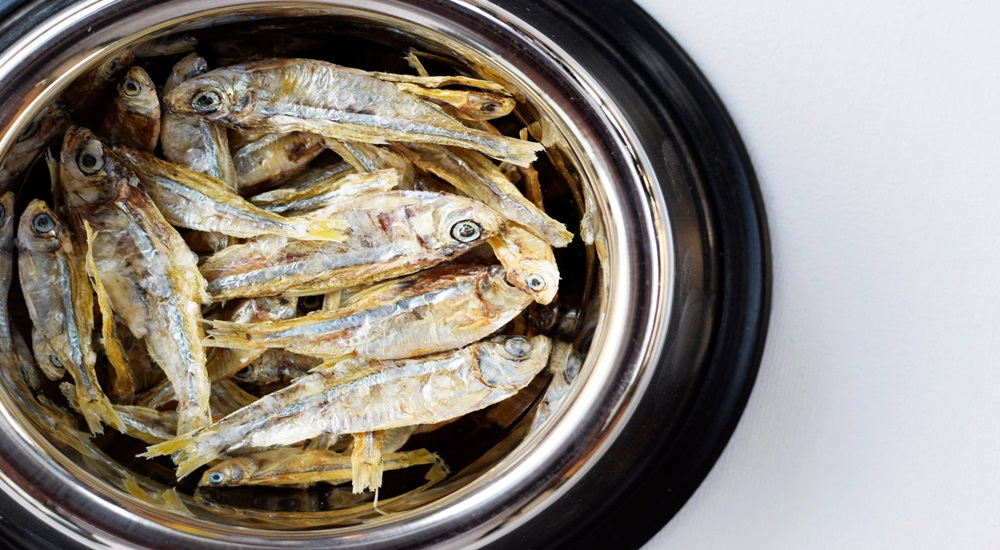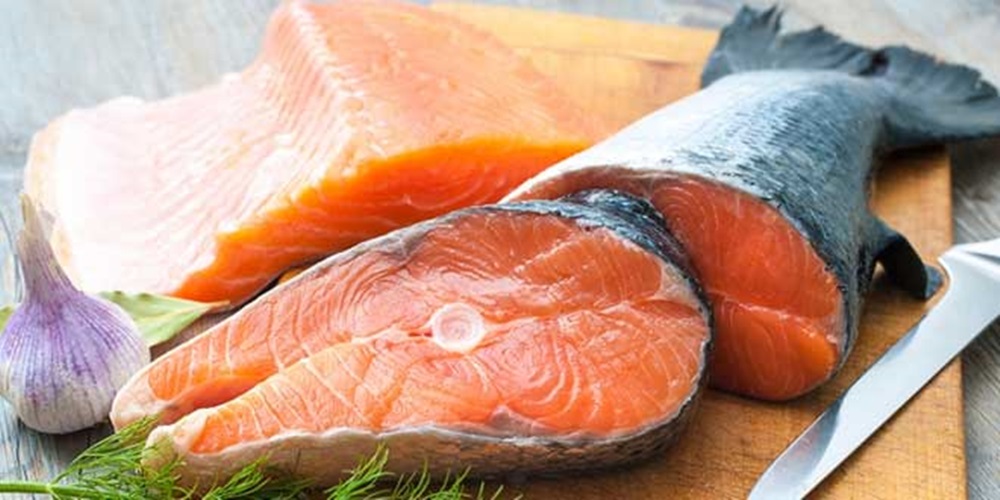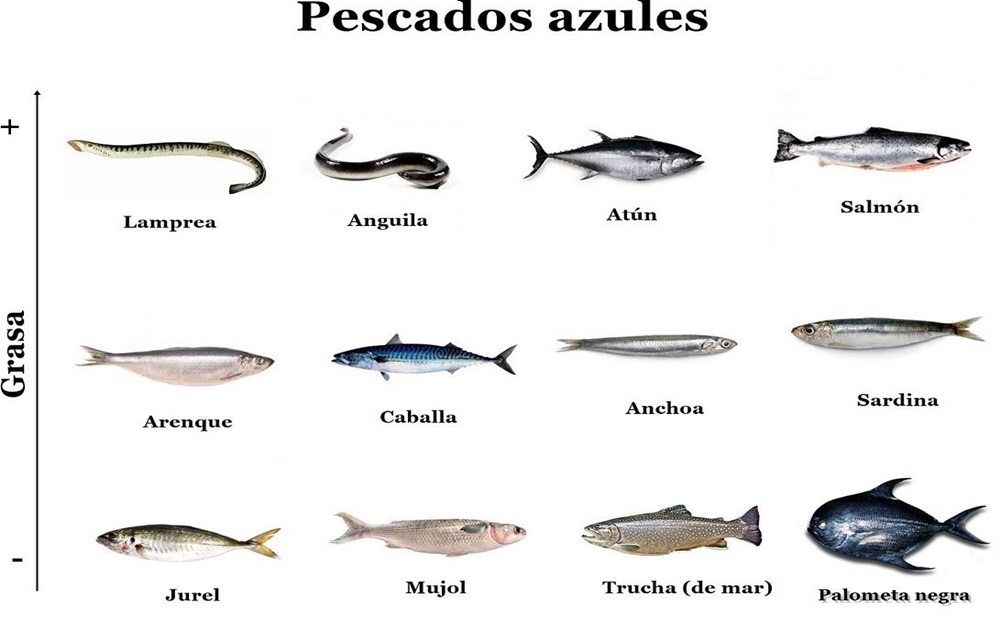Today the world comments on the great benefits of consuming fish, however, what is good for humans is not always good for dogs. That is why today we will talk about whether dogs can eat fish and how the consumption of this food benefits them. In addition to this, we will know if it is better to give them raw or cooked.

What fish are good for dogs?
Contrary to the legend about giving this food to dogs, feeding them fish brings multiple benefits for the pet, many people believe that fish is a toxic food for canines, however, this is completely false, until now it has not been known that this is actually true, although it may be that some of the seafood is causing different Allergies in Dogs. This tells us that, as owners, we can add fish to our dog's diet, whether it is white or blue meat.
Each type of fish offers different benefits that will surely be good for your pet, since they will provide different protein values that help the growth and development of dogs in general. One of the things that we should know for health reasons is that oily fish has more calories than white fish, this means that the latter can be consumed in greater quantity than the first.
Even knowing this, veterinarians recommend the consumption of oily fish more because it provides much more omega 3 and this positively influences the health of the animal's coat, in obtaining better immunity and helps prevent the dog from suffering of some heart diseases.
Remember that dogs, being part of the canid family, are carnivorous animals, so their diet should have a good portion of calories that they can get from meat and fish, so it is recommended that both be mixed to cover the necessary amount required. We must take into account that when we decide to be the ones who prepare a diet for our pets, we must pay attention to the nutrients, proteins and carbohydrates that he must consume, but to have a balanced and correct diet.
Now we are going to know which are the best fish that your dog can consume because they provide them with more nutrients. Although you can give them any type of fish, we will give you a small list with the most outstanding and beneficial for your furry friend:
- Salmon
- Tuna
- Sardines
- Mackerel
- Herring
- Hake
Benefits of fish for dogs
We have already known that the consumption of any type of fish for dogs it is really good for them, so we can give it to them without any problem as an additional supplement or include it directly in their diet. Now we are going to know exactly what benefits it brings to the canine. Let us remember that each type of fish varies its nutritional contribution, however, they all contribute, to a greater or lesser extent, in obtaining proteins.
All dogs, being carnivorous, should have a higher consumption of animal protein in their diet, this will be important for their health and nutrition, this is because the lack of these nutrients will prevent these animals from having a good production of enzymes, hormones, tissues and cells that are essential for the dog.
Now we are going to go into a slightly more specific topic and we will know the nutritional characteristics that each type of fish has in dogs:
Benefits of white fish for dogs
This type of fish is also known as "lean fish", as we said before, these have different percentage values of calories and fatty acids than blue fish, knowing that blue fish wins in quantity. We can say that white fish provides approximately 110 Kcal, so it is very good for those dogs that must have a low-calorie diet since they need to lose weight.
White fish is highly recommended for consumption by older dogs as they provide a great protein intake and the fact that they are low in fat greatly helps them to have good health at such an important age. Next, we will mention some other benefits that white fish has:
• B vitamins (B3, B9, B12)
• Vitamin A
• Minerals (calcium and phosphorus)
Now, as we have said before, it is extremely important that the dog's diet has an adequate balance of all these benefits, since if any is missing, the animal will have a deficit of it, which could have consequences for its health. If a dog does not consume an adequate amount of calcium, he may suffer from diseases that affect his bones. One more reason why it is always advisable to include fish in the food of canines and thus avoid pathologies that can negatively influence them.
We can feed our dogs any type of white fish, an example of this is hake. However, first we must find out and take into account the nutritional values of each one and thus choose the one that benefits them the most.
Benefits of oily fish for dogs
As we already know, oily fish provides a large amount of fat, this being greater than that of white fish, but they are not saturated fats, in fact, they are known as "polyunsaturated" fats, which offer a large amount of omega 3. This type of food is always very good, due to its primary contribution of omega 3, which helps dogs to have a healthy and shiny coat. In addition, we must bear in mind that omega 3 is a nutrient that can help prevent heart disease.
One of the contributions that very few people know about and that oily fish has is its ability to be anti-inflammatory, this is extremely beneficial for those canines that suffer from joint problems and who always have to endure constant pain. Its vitamin content is composed of:
• Vitamin A
• Vitamin B (B1, B2, B3 and B12)
• Vitamin D
Among all the types of oily fish that we can know, the one that provides the most benefits is salmon, this food brings with it a large number of nutritional values that will help your dog to be much healthier and more energetic.
How to give fish to my dog?
We already know that our dog can eat any type of fish, now the question is how should we give it to him? Perhaps including it in their diet at the beginning is not easy for some dogs that are not used to its taste or smell, however, we can add it little by little. The best thing and what is recommended is that the food is previously cooked and after doing so, all the bones must be removed, when cooking it we eliminate the bacteria that may be in the fish.
The healthiest thing is that the fish is placed in water and boiled for a few minutes, another way could be to prepare it on the grill. It is not recommended that it be prepared fried or battered, as this would be counterproductive for the dog. We must bear in mind that the correct way to cook this food would be by boiling it or roasting it over low heat, because in this way we avoid losing nutrients, the fish should not be completely cooked, but should be medium.
It is not highly recommended, but if you are one of the people who prefer to give the canine raw fish, you must first make sure that it is a quality product and free of bacteria, for this you must know where it comes from and who its distributors are.
After the fish is cooked, it should be crushed and given to the dog with a little olive oil, as this is very good for canines and if given in small portions, it has no side effects. Another form of sin that you can give your dog is canned, this you should offer it as it comes in the can, you do not need to do any other process, although if you like you can add a little olive oil. Therefore, we can state that can dogs eat tuna no problem.
What is the amount of fish that I can give my dog?
Until today there are many doubts about the amount of fish or protein that dogs should eat per day, some veterinarians recommend that 80% of their daily diet is made up of protein, while some others affirm that it is best that it is only the 70%. How will we know which of these two options is the best for our friend? Well, ideally, before deciding, we try both ways and then select the one that suits you best, although we can also alternate between the two.
The remaining 20 or 30 percent of the diet must be completed by adding other types of food and nutrients that are suitable for your pet, these can be cereals, fruits, vegetables or other food that the veterinarian suggests you add. But if what we want is to know the exact amount in grams that we should give our, but, the ideal is that it be 120 or 150 grams for every 10 kilograms of weight.
You must bear in mind that maintaining a protein diet based on only fish is not ideal for the dog, since it is essential that it be varied, the protein can be obtained from birds or cattle, balancing between the different types of proteins will help your dog is in optimal health. There are exceptions to this rule, as there are dogs that are allergic to some meats and their consumption should be avoided.
Can I mix the fish with other foods?
Many people wonder if dogs eat fish alone or if they can also eat it with other foods. The answer is yes, you can combine fish with some other resources, be it rice, vegetables or grains, this in addition to benefiting them in terms of the balance of different nutrients, they will surely love it too. Now, you should know that it is strictly forbidden to mix any type of fish with the feed or perrarina.
Why shouldn't we? Very simple, the feed and all food that we buy in veterinary stores, go through a very different course of digestion than homemade food, therefore, these two types of food should not be mixed. Doing so can have consequences on the dog's digestion and health.
Finally, we must know that not all foods that humans can eat are healthy for a dog. Before you decide that you want to use the Homemade Dog Food, first you must know everything about the subject of allowed foods and those not allowed in the canine diet, because in this way you will ensure that you are not feeding your canine any food that could be harmful in one way or another.
You can also choose to ask your vet about the right foods to give your dog. The doctor may even offer you a guide showing different recipes that you can prepare for your dog for his meals. If your vet doesn't have this resource, you can find out for yourself online. However, we recommend that before preparing any of them you first consult your doctor if it may or may not be ingested by your puppy.





